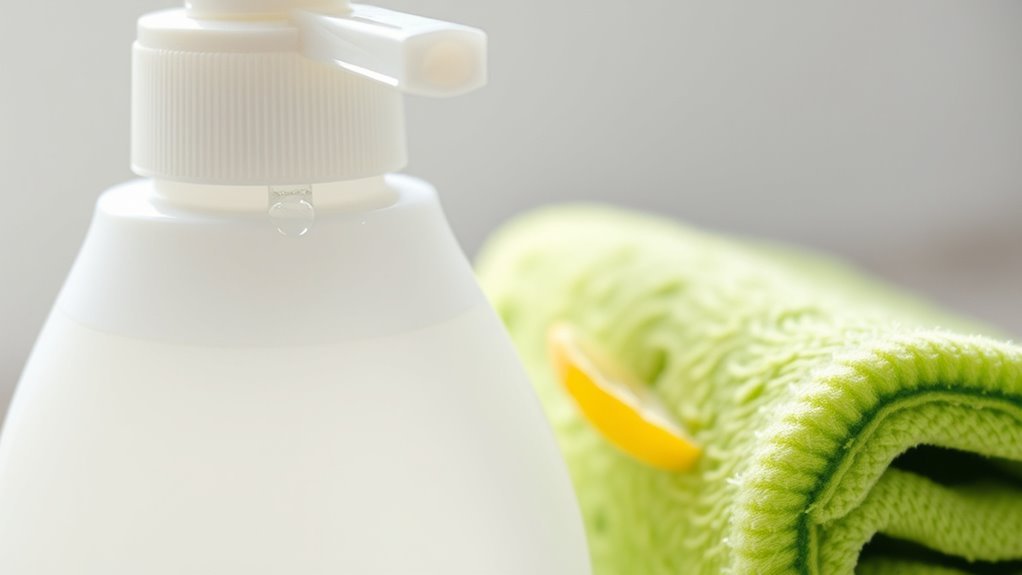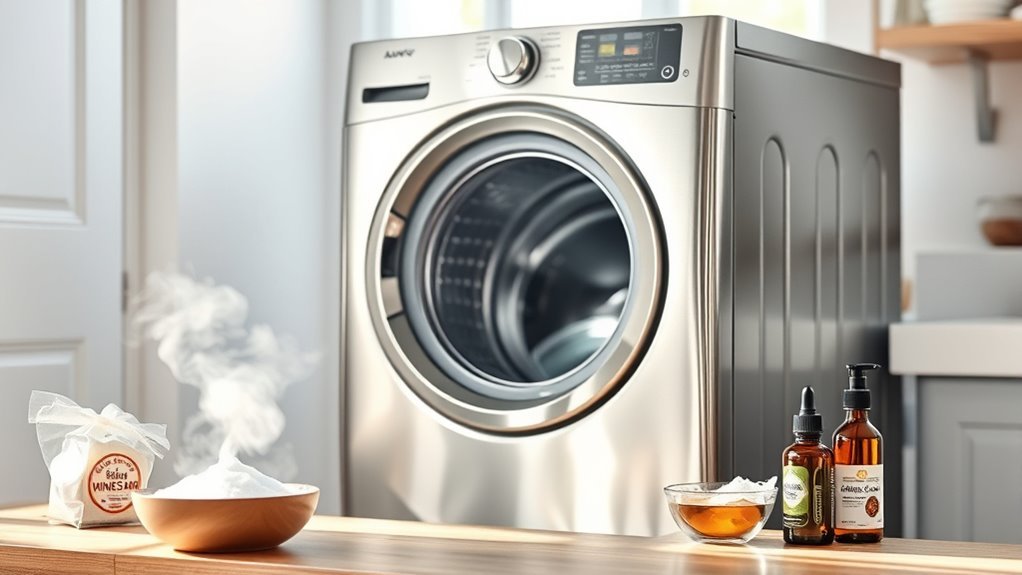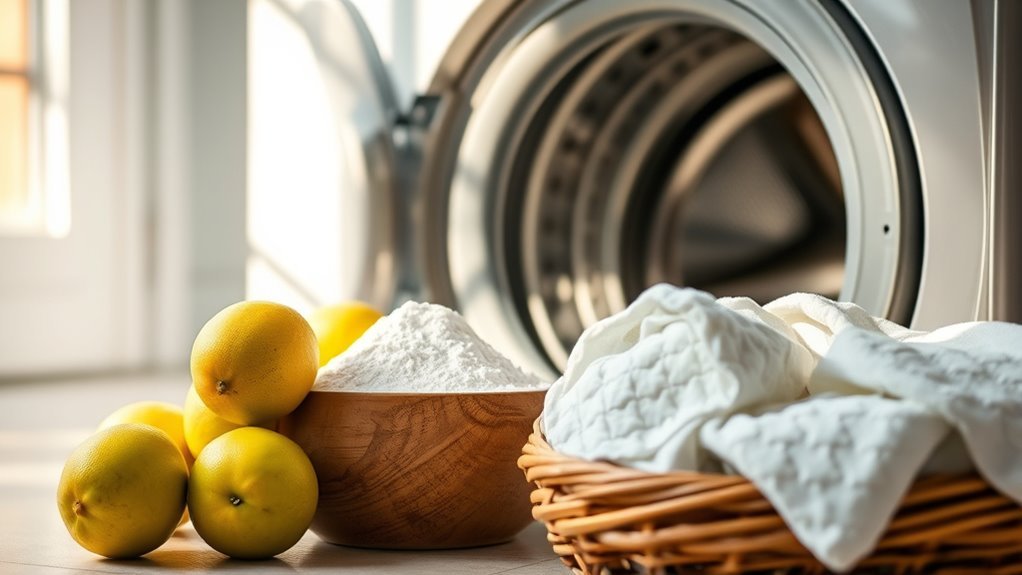Natural Cleaning Hacks for Your Washer
You can keep your washer fresh and odor-free using natural cleaners like vinegar, baking soda, and lemon juice. Run a hot cycle with two cups of vinegar to break down grime, or add baking soda to neutralize smells and residue. Lemon juice targets mold and mildew naturally. Don’t forget to clean the detergent dispenser monthly and wipe the door seal with essential oils to prevent buildup and cracks. Using hot water cycles boosts cleaning power. There’s more to learn about timing and tips to maintain your machine effortlessly.
Benefits of Using Natural Cleaners

While many people rely on chemical cleaners for their washers, using natural cleaners offers several key benefits that you might not have considered. Choosing eco friendly alternatives not only reduces your environmental impact but also protects your home’s indoor air quality. These natural options typically avoid harsh toxins found in conventional products, which means fewer allergens and irritants affecting your skin and respiratory system. Plus, you gain peace of mind knowing you’re safeguarding your family’s health without compromising cleaning power. Natural cleaners break down grime effectively while maintaining the washer’s integrity, helping it last longer and perform better. By embracing these simple, sustainable choices, you’re not just cleaning your machine—you’re reclaiming freedom from harmful chemicals and fostering a healthier, more responsible lifestyle. Many natural cleaners use plant-based ingredients, which break down naturally and are safer for both health and the environment.
How to Clean the Washer Drum With Vinegar
You can tackle mold and odors in your washer drum effectively by using vinegar, a natural cleaner known for breaking down buildup and disinfecting surfaces. Start by pouring two cups of white vinegar into the drum, then run a hot water cycle to loosen grime and eliminate smells. Following this simple step-by-step process regularly helps keep your washer fresh and prevents future mold growth. Ensuring proper ventilation during and after cleaning helps reduce moisture and prevent mold recurrence.
Vinegar Benefits Explained
Vinegar is a powerful, natural cleaner that’s perfect for tackling the buildup and odors often found in your washer drum. Its acidic nature breaks down soap scum, mineral deposits, and mildew, restoring your machine’s freshness without harsh chemicals. Beyond cleaning your washer, vinegar uses include deodorizing fabrics and removing stains, making it a versatile, eco-friendly staple. If you’re looking for vinegar alternatives, lemon juice or baking soda can also help, but vinegar’s affordability and effectiveness make it a top choice. By incorporating vinegar into your washer maintenance routine, you’re choosing a simple, safe method that prolongs your machine’s life and keeps your laundry smelling clean. This natural approach aligns perfectly with your desire for freedom from toxic cleaners and complicated products.
Step-by-Step Cleaning Guide
Before diving into the cleaning process, gather the necessary materials: white distilled vinegar, a measuring cup, and a microfiber cloth. This simple setup is all you need for effective washer maintenance using eco friendly products. Here’s how to clean your washer drum with vinegar:
- Pour 2 cups of white distilled vinegar directly into the drum.
- Run a hot water cycle without any clothes to let the vinegar break down residue and buildup.
- Once the cycle finishes, dip your microfiber cloth in vinegar and wipe down the drum’s interior, focusing on crevices.
- Leave the washer door open for an hour to air dry and prevent moisture buildup.
This method keeps your washer fresh and functioning efficiently while avoiding harsh chemicals.
Preventing Mold and Odors
Although washers are designed to handle moisture, trapped water and detergent residue can create the perfect environment for mold and unpleasant odors to develop. To guarantee effective mold prevention and odor control, clean your washer drum regularly with white vinegar. Pour two cups of vinegar into the drum and run a hot water cycle without any laundry. The vinegar naturally breaks down buildup, kills mold spores, and neutralizes odors. After the cycle, wipe the drum, gasket, and door seal with a microfiber cloth soaked in vinegar to reach hidden moisture pockets. Leave the door open after each use to allow air circulation, preventing mold growth. These simple steps help you maintain a fresh washer, giving you the freedom to enjoy clean clothes without worrying about lingering smells or mold issues.
Baking Soda for Removing Odors and Residue
You can rely on baking soda to effectively neutralize stubborn odors trapped in your washer while breaking down leftover detergent and fabric softener residue. Simply add half a cup of baking soda to the drum before running a hot water cycle to refresh your machine. For best results, combine it with vinegar occasionally to tackle buildup and maintain a clean, fresh-smelling washer. Adding essential oils like lemon or eucalyptus can enhance the cleaning process with antibacterial benefits and a pleasant scent.
Odor Neutralizing Properties
When your washer starts to develop unpleasant odors, baking soda can be a simple yet powerful solution to neutralize smells and break down residue. Known for its excellent odor absorption, baking soda acts like a natural deodorant inside your machine. Here’s how you can harness its odor neutralizing properties:
- Sprinkle 1/2 cup of baking soda directly into the drum before running a hot water cycle.
- Allow the baking soda to dissolve and absorb odors lingering in hard-to-reach areas.
- Combine it with vinegar occasionally for enhanced deodorizing power.
- Use baking soda regularly to maintain a fresh-smelling washer without harsh chemicals.
Residue Removal Benefits
Besides neutralizing odors, baking soda is highly effective at breaking down and removing residue that builds up inside your washer. Over time, residue buildup from detergent residue and fabric softeners can clog your machine, leading to poor cleaning performance and even mechanical issues. Baking soda’s alkaline nature gently dissolves these deposits, restoring your washer’s efficiency without harsh chemicals. By incorporating baking soda into your cleaning routine, you prevent residue from accumulating on the drum and internal components, which keeps your washer running smoothly and your clothes cleaner. This natural approach not only extends your washer’s lifespan but also gives you peace of mind. Embracing baking soda’s residue removal benefits empowers you to maintain a fresh, efficient washing machine effortlessly.
Usage Tips and Tricks
A few simple techniques can make using baking soda for odor and residue removal in your washer both effective and hassle-free. To boost washer efficiency while embracing eco friendly alternatives, follow these tips:
- Add half a cup of baking soda directly into the drum before running a hot water cycle to neutralize odors and dissolve buildup.
- For tough residues, mix baking soda with water to form a paste and scrub the detergent drawer and rubber seals.
- Combine baking soda with white vinegar for a powerful natural clean, but use them separately in cycles to avoid neutralizing effects.
- Regularly schedule monthly cleanings using baking soda to maintain peak washer performance and prolong its lifespan.
These practical steps let you enjoy a fresh, efficient wash without relying on harsh chemicals.
Using Lemon Juice to Eliminate Mold and Mildew
Although mold and mildew can stubbornly cling to your washer’s interior, using lemon juice offers a natural and effective solution to tackle them. The lemon juice benefits go beyond its fresh scent; its natural acidity helps break down mold and mildew, making it easier to remove. To use, simply squeeze fresh lemon juice onto affected areas or mix it with water for a gentle scrub. Let it sit for 10-15 minutes before wiping clean. This method not only cleans but also aids in mold prevention by creating an environment that’s less hospitable to fungal growth. Regularly incorporating lemon juice into your cleaning routine guarantees your washer stays fresh, mold-free, and functioning well without harsh chemicals. Enjoy the freedom of a naturally clean washer! For enhanced antibacterial effects, you can also combine lemon juice with salt as a gentle abrasive to lift stubborn grime and boost cleaning power.
Cleaning the Detergent Dispenser Naturally

Keeping your washer’s detergent dispenser clean is key to preventing buildup that can cause clogs and odors. To tackle detergent buildup naturally, follow these simple steps:
- Remove the dispenser tray carefully from your washer.
- Soak it in a mixture of white vinegar and warm water for 15-20 minutes to break down residue.
- Use an old toothbrush to scrub away any remaining buildup, focusing on corners and crevices.
- Rinse thoroughly with warm water and dry completely before reinserting.
For best results, maintain a regular cleaning frequency of once a month. This routine prevents hardened detergent residues and keeps your machine fresh, ensuring freedom from odors and clogs. By using natural ingredients like vinegar, you avoid harsh chemicals while protecting your washer’s longevity. Regular maintenance also helps in avoiding harsh chemicals and synthetic additives that can damage both fabrics and the environment.
Maintaining the Washer Door Seal With Essential Oils
One simple way to prevent mold and mildew buildup on your washer door seal is by incorporating essential oils into your cleaning routine. Essential oil blends like tea tree, eucalyptus, and lavender offer natural antifungal and antibacterial properties that keep the seal fresh and free from harmful growth. After each wash, use a cotton cloth dampened with a few drops of your chosen blend to wipe down the rubber gasket thoroughly. This practice complements proper sealing techniques by maintaining the seal’s flexibility and integrity, preventing cracks where moisture can accumulate. Regularly applying these oils not only extends the life of your washer door seal but also keeps your laundry environment healthier—giving you the freedom to enjoy fresh, clean clothes without harsh chemicals. For best results, always wipe in the direction of the steel grain to ensure a thorough and streak-free clean.
The Role of Hot Water in Washer Cleaning

While maintaining the washer door seal with essential oils helps prevent mold, tackling the interior of your machine requires a different approach. Hot water plays a vital role in deep cleaning by enhancing hot water effectiveness against grime and detergent buildup. To make the most of temperature settings:
- Set your washer to the hottest water temperature safe for your fabrics.
- Use natural cleaners like baking soda or vinegar during the hot cycle.
- Run an empty cycle to flush out residues from pipes and drum.
- Repeat monthly to maintain ideal cleanliness and prevent odors.
Incorporating vinegar and baking soda during cleaning not only helps remove buildup but also offers a chemical-free and eco-friendly solution.
Scheduling Regular Natural Maintenance for Your Washer
Because washers are prone to buildup and odors over time, scheduling regular natural maintenance is essential to keep yours running efficiently. Setting up washer maintenance with regular schedules prevents grime and mildew, extending your machine’s life. Here’s a simple plan to keep freedom from constant worry about your washer:
| Task | Frequency |
|---|---|
| Vinegar rinse cycle | Monthly |
| Baking soda scrub | Every 2 months |
| Clean detergent drawer | Quarterly |
| Inspect hoses | Twice a year |
| Wipe door seals | After every use |
Tips for Keeping Your Washer Fresh Between Deep Cleans
Keeping your washer fresh between deep cleans helps prevent buildup and odors from taking hold, making those thorough maintenance sessions less intimidating. To maintain washer freshness with natural maintenance, follow these practical tips:
- Leave the washer door open after each use to allow air circulation and moisture evaporation.
- Wipe down the drum, door seal, and detergent dispenser regularly with a vinegar-water solution to prevent mold.
- Use baking soda during your regular wash cycles to neutralize odors naturally.
- Avoid overloading your washer, as it can trap moisture and promote mildew growth. Additionally, using vinegar as a natural fabric softener can help keep your laundry smelling fresh and your washer clean.
Frequently Asked Questions
Can Natural Cleaners Damage My Washer’S Internal Components?
Think of your washer as a delicate dance partner: you want to move gently but effectively. Using natural cleaners wisely won’t damage your washer’s internal components; in fact, they’re often kinder than harsh chemicals. For solid washer maintenance, choose gentle ingredients like vinegar or baking soda, avoiding abrasive or acidic substances that could corrode parts. With careful use, natural cleaners help keep your machine fresh without risking harm, giving you freedom from worry.
How Often Should I Deep Clean My Washer Naturally?
You should deep clean your washer naturally about once a month to maintain cleanliness and keep it running smoothly. Knowing how to clean it regularly prevents buildup of detergent residue and mold, which can cause odors or damage. Use simple ingredients like vinegar and baking soda for an effective, chemical-free clean. Sticking to this routine helps you enjoy fresh laundry and extends your machine’s lifespan without hassle or harsh chemicals.
Are Natural Cleaning Methods Safe for All Washer Types?
You might think natural cleaning methods could wreck your washer, but they’re actually like a gentle spa day for your machine! Most washers, whether front or top load, respond well to eco friendly alternatives like vinegar and baking soda. Just follow washer maintenance tips closely—avoid harsh abrasives and check your manual. These green solutions keep your washer fresh without the chemical chaos, giving you freedom to clean safely and sustainably.
Can I Use Natural Cleaners With High-Efficiency (HE) Washers?
You can definitely use HE detergent alternatives in your high-efficiency washer, but it’s essential to choose eco-friendly solutions that won’t cause excess suds or damage. Natural ingredients like white vinegar or baking soda work well as gentle cleaners and deodorizes without leaving residue. Just be sure to use them in moderation and avoid harsh substances. This way, you’re keeping your washer efficient and your laundry routine greener, giving you freedom from chemicals.
What Natural Ingredients Should I Avoid Using in My Washer?
You should avoid using abrasive substances like vinegar and baking soda together, as they can cause unwanted chemical reactions that might damage your washer’s components. Also, steer clear of lemon juice or other acidic cleaners, which can corrode rubber seals over time. Harsh chemicals or bleach aren’t ideal either, since they can wear down your machine. Stick to gentle, natural cleaners that won’t compromise your washer’s longevity or performance.






